| Listing 1 - 10 of 13 | << page >> |
Sort by
|
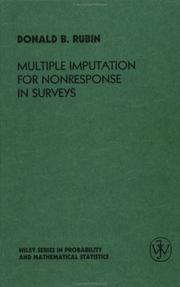
ISBN: 047108705X 9780471087052 Year: 1987 Publisher: New York: Wiley,
Abstract | Keywords | Export | Availability | Bookmark
 Loading...
Loading...Choose an application
- Reference Manager
- EndNote
- RefWorks (Direct export to RefWorks)
Mathematical statistics --- Multiple imputation (Statistics) --- 303.625.25 --- #SBIB:303H520 --- AA / International- internationaal --- 303.6 --- 304.8 --- 301 --- Imputation, Multiple (Statistics) --- Monte Carlo method --- Missing observations (Statistics) --- Nonresponse bij sociaal onderzoek --- Methoden sociale wetenschappen: techniek van de analyse, algemeen --- Raming : theorie (wiskundige statistiek). Bayesian analysis and inference. --- Steekproeftheorie. --- Techniek van statistische inlichtingen. Organisatie van de statistische enquêtes. Statistische kritiek. --- 303.625.25 Nonresponse bij sociaal onderzoek --- Nonresponse (Statistics) --- Social surveys --- Response rate of social surveys --- Non-response (Statistics) --- Sampling (Statistics) --- Response rate --- Techniek van statistische inlichtingen. Organisatie van de statistische enquêtes. Statistische kritiek --- Raming : theorie (wiskundige statistiek). Bayesian analysis and inference --- Steekproeftheorie --- Nonresponse --- Social surveys - Response rate
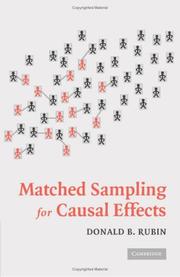
ISBN: 9780521857628 9780521674362 0521857627 0521674360 9780511810725 0511246102 9780511246791 051124679X 9780511244643 0511244649 9780511246104 0511810725 1280702605 9781280702600 0511245394 9780511245398 9786610702602 6610702608 1107166837 0511322879 Year: 2006 Publisher: Cambridge Cambridge University Press
Abstract | Keywords | Export | Availability | Bookmark
 Loading...
Loading...Choose an application
- Reference Manager
- EndNote
- RefWorks (Direct export to RefWorks)
Matched sampling is often used to help assess the causal effect of some exposure or intervention, typically when randomized experiments are not available or cannot be conducted. This book presents a selection of Donald B. Rubin's research articles on matched sampling, from the early 1970s, when the author was one of the major researchers involved in establishing the field, to recent contributions to this now extremely active area. The articles include fundamental theoretical studies that have become classics, important extensions, and real applications that range from breast cancer treatments to tobacco litigation to studies of criminal tendencies. They are organized into seven parts, each with an introduction by the author that provides historical and personal context and discusses the relevance of the work today. A concluding essay offers advice to investigators designing observational studies. The book provides an accessible introduction to the study of matched sampling and will be an indispensable reference for students and researchers.
Mathematical statistics --- Statistical matching --- Sampling (Statistics) --- wiskundige statistiek --- Concatenation, File (Statistics) --- Data fusion (Statistics) --- Data matching (Statistics) --- Data merging (Statistics) --- File concatenation (Statistics) --- Fusion, Data (Statistics) --- Imputation, Mass (Statistics) --- Mass imputation (Statistics) --- Matching, Data (Statistics) --- Matching, Statistical --- Merging, Data (Statistics) --- Microsimulation modeling (Statistics) --- Modeling, Microsimulation (Statistics) --- Random sampling --- Statistics of sampling --- Statistics --- Statistical matching.
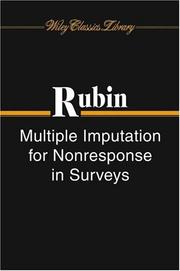
ISBN: 0471655740 Year: 2004 Publisher: Hoboken, N.J. Wiley-Interscience
Abstract | Keywords | Export | Availability | Bookmark
 Loading...
Loading...Choose an application
- Reference Manager
- EndNote
- RefWorks (Direct export to RefWorks)
Book
ISBN: 9780521885881 0521885884 9781139025751 1316093816 1316094111 1139025759 Year: 2015 Publisher: New York : Cambridge University Press,
Abstract | Keywords | Export | Availability | Bookmark
 Loading...
Loading...Choose an application
- Reference Manager
- EndNote
- RefWorks (Direct export to RefWorks)
Most questions in social and biomedical sciences are causal in nature: what would happen to individuals, or to groups, if part of their environment were changed? In this groundbreaking text, two world-renowned experts present statistical methods for studying such questions. This book starts with the notion of potential outcomes, each corresponding to the outcome that would be realized if a subject were exposed to a particular treatment or regime. In this approach, causal effects are comparisons of such potential outcomes. The fundamental problem of causal inference is that we can only observe one of the potential outcomes for a particular subject. The authors discuss how randomized experiments allow us to assess causal effects and then turn to observational studies. They lay out the assumptions needed for causal inference and describe the leading analysis methods, including matching, propensity-score methods, and instrumental variables. Many detailed applications are included, with special focus on practical aspects for the empirical researcher.
Biomathematics. Biometry. Biostatistics --- Quantitative methods in social research --- Statistical science --- Quantitative methods (economics) --- Social sciences --- Causation --- Inference --- Sciences sociales --- Causalité --- Inférence (Logique) --- Research --- Recherche --- Causation. --- Inference. --- Research. --- Inférence --- Causalité --- Inférence (Logique) --- Causalité. --- Inférence. --- Recherche. --- Ampliative induction --- Induction, Ampliative --- Inference (Logic) --- Reasoning --- Causality --- Cause and effect --- Effect and cause --- Final cause --- Beginning --- God --- Metaphysics --- Philosophy --- Necessity (Philosophy) --- Teleology --- Social science research --- Social sciences - Research --- Causalité. --- Inférence.
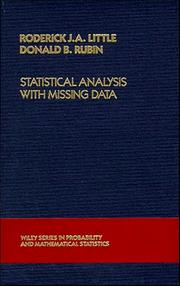
ISBN: 0471802549 9780471802549 Year: 1987 Publisher: New York (N.Y.): Wiley,
Abstract | Keywords | Export | Availability | Bookmark
 Loading...
Loading...Choose an application
- Reference Manager
- EndNote
- RefWorks (Direct export to RefWorks)
* Provides updated or revised material in most of the chapters.
Mathematical statistics --- Missing observations (Statistics) --- Méthode statistique --- Statistical methods --- Modèle --- Models --- 303.7 --- 519.23 --- #SBIB:303H520 --- #SBIB:303H14 --- 519.5 --- Data, Missing (Statistics) --- Missing data (Statistics) --- Missing values (Statistics) --- Observations, Missing (Statistics) --- Values, Missing (Statistics) --- Estimation theory --- Multivariate analysis --- Multiple imputation (Statistics) --- Mathematics --- Statistical inference --- Statistics, Mathematical --- Statistics --- Probabilities --- Sampling (Statistics) --- Analysetechnieken. Statistische analyse --(sociaal onderzoek) --- Statistical analysis. Inference methods --- Methoden sociale wetenschappen: techniek van de analyse, algemeen --- Methoden en technieken van de communicatiewetenschap --- Mathematical statistics. --- Missing observations (Statistics). --- 519.23 Statistical analysis. Inference methods --- 303.7 Analysetechnieken. Statistische analyse --(sociaal onderzoek) --- Donnees manquantes --- Modele bayesian
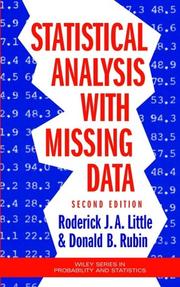
ISBN: 0471183865 9780471183860 Year: 2002 Publisher: New York: Wiley,
Abstract | Keywords | Export | Availability | Bookmark
 Loading...
Loading...Choose an application
- Reference Manager
- EndNote
- RefWorks (Direct export to RefWorks)
* Emphasizes the latest trends in the field. * Includes a new chapter on evolving methods. * Provides updated or revised material in most of the chapters.
Mathematical statistics --- QA 276.L57 General Works (Mathematical Statistics) --- Missing observations (Statistics) --- Statistique mathématique --- Observations manquantes (Statistique) --- #PBIB:2005.2 --- 519.2 --- 519.23 --- 519.5 --- Data, Missing (Statistics) --- Missing data (Statistics) --- Missing values (Statistics) --- Observations, Missing (Statistics) --- Values, Missing (Statistics) --- Estimation theory --- Multivariate analysis --- Multiple imputation (Statistics) --- Mathematics --- Statistical inference --- Statistics, Mathematical --- Statistics --- Probabilities --- Sampling (Statistics) --- Probability. Mathematical statistics --- Statistical analysis. Inference methods --- Statistical methods --- Mathematical statistics. --- Basic Sciences. Statistics --- Statistical Analysis --- Missing observations (Statistics). --- Statistical Analysis. --- 519.23 Statistical analysis. Inference methods --- 519.2 Probability. Mathematical statistics --- Statistique mathématique
Book
ISBN: 9780470526798 Year: 2020 Publisher: Hoboken, NJ Wiley
Abstract | Keywords | Export | Availability | Bookmark
 Loading...
Loading...Choose an application
- Reference Manager
- EndNote
- RefWorks (Direct export to RefWorks)
Mathematical statistics --- Mathematical statistics. --- Missing observations (Statistics) --- Missing observations (Statistics). --- Data, Missing (Statistics) --- Missing data (Statistics) --- Missing values (Statistics) --- Observations, Missing (Statistics) --- Values, Missing (Statistics) --- Estimation theory --- Multivariate analysis --- Multiple imputation (Statistics) --- Mathematics --- Statistical inference --- Statistics, Mathematical --- Statistics --- Probabilities --- Sampling (Statistics) --- Statistical methods
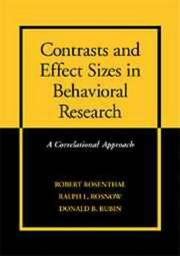
ISBN: 0521659809 0521652588 0511804407 Year: 2000 Publisher: Cambridge : Cambridge University Press,
Abstract | Keywords | Export | Availability | Bookmark
 Loading...
Loading...Choose an application
- Reference Manager
- EndNote
- RefWorks (Direct export to RefWorks)
Contrasts are statistical procedures for asking focused questions of data. Compared to diffuse or omnibus questions, focused questions are characterized by greater conceptual clarity and greater statistical power when examining those focused questions. If an effect truly exists, we are more likely to discover it and to believe it to be real when asking focused questions rather than omnibus ones. Researchers, teachers of research methods and graduate students will be familiar with the principles and procedures of contrast analysis, but will also be introduced to a series of newly developed concepts, measures, and indices that permit a wider and more useful application of contrast analysis. This volume takes on this new approach by introducing a family of correlational effect size estimates.
Analysis of variance. --- Psychology --- Psychometrics. --- Social sciences --- Methoden en technieken --- Statistical methods. --- statistiek. --- Psychometrics --- Analysis of variance --- Psychométrie --- Analyse de variance --- Psychologie --- Sciences sociales --- Statistical methods --- Méthodes statistiques --- #PBIB:2000.2 --- Measurement, Mental --- Measurement, Psychological --- Psychological measurement --- Psychological scaling --- Psychological statistics --- Psychometry (Psychophysics) --- Scaling, Psychological --- Psychological tests --- Scaling (Social sciences) --- ANOVA (Analysis of variance) --- Variance analysis --- Mathematical statistics --- Experimental design --- Measurement --- Scaling --- Methodology --- Health Sciences --- Psychiatry & Psychology
Digital
Year: 1999 Publisher: Tilburg Tilburg University
Abstract | Keywords | Export | Availability | Bookmark
 Loading...
Loading...Choose an application
- Reference Manager
- EndNote
- RefWorks (Direct export to RefWorks)
Book
Year: 1998 Publisher: Washington, D.C. : U.S. Dept. of Transportation, National Highway Traffic Safety Administration,
Abstract | Keywords | Export | Availability | Bookmark
 Loading...
Loading...Choose an application
- Reference Manager
- EndNote
- RefWorks (Direct export to RefWorks)
Drinking and traffic accidents --- Blood alcohol --- Alcohol in the body --- Measurement --- Statistical methods.
| Listing 1 - 10 of 13 | << page >> |
Sort by
|

 Search
Search Feedback
Feedback About UniCat
About UniCat  Help
Help News
News